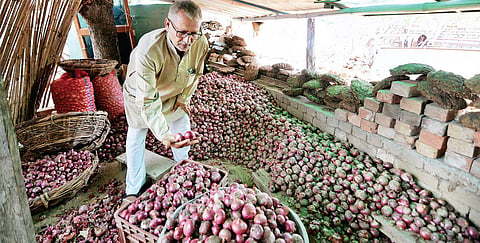

NEW DELHI: A‘silent revolution’ is growing in the outskirts of Delhi as its villages have started taking baby steps towards achieving the organic state tag, said Manisha Saxena, secretary cum commissioner (Development) of Delhi government. By ‘silent revolution’, she refers to the farmers in the national capital adopting organic fertilisers and pesticide-free cultivation. “In the 1960s, farmers were given small tablets to enhance production. We were advised to use one. Instead, we dropped four-five of them in our fields without giving a thought to their implications. Only high production was on our mind,” said Ummed Singh Rana (79) of Qutabgarh, located on the Delhi-Haryana border.
Rana believes that the organic method will reduce production by 40 but has agreed to shed ‘unnatural’ components, to keep soil ‘alive’, he has been utilising for decades.“The government is helping us. I hope they will continue till we don’t start getting the appropriate price for our crop. If the government gives us subsidy, this will instil trust and confidence in farmers and more people will follow the suit,” said Rana.
He is one of many farmers who have signed up for Delhi government’s initiative to promote the traditional way of farming in the city as part of the Centre government sponsored scheme, ‘Paramparagat Krishi Vikas Yojana’, a project of National Mission of Sustainable Agriculture (NMSA). Responsibility for its implementation is with the district-level functionaries of the states and in Delhi, the development department is the executing agency, which has engaged seven agencies — NGOs and regional councils (RCs) for 1,500 clusters.
The city villages have been g
rouped into clusters with each cluster containing 20 hectare (Ha) or 50 acres and 20-50 farmers in a cluster. The development department has formed 500 clusters and 1,000 more are to be created. The groundwork on the project was kicked off six months ago. Several awareness programmes such as dissemination of latest technologies and experts’ workshop have been organised.
“NGOs, or regional councils roped in to impart training and monitor the development have already organised exposure trips where growers are given a demonstration. Farmers in batches were taken to neighbouring states — Haryana and Uttar Pradesh,” said Saxena. As part of the scheme, cultivators are also being provided with agricultural equipment and subsidy to purchase seeds. “They are given the training to prepare bio-fertilisers and herbal spray to protect their crop. All possible help to prepare good quality, natural manure from cow dung is being provided.
We are also supplying dhaincha (Sesbania aculeata) green manure crop seed,” said Vimal Prakash, senior consultant with Agricultural Finance Corporation (AFC) India Limited, one of the RCs engaged by the development department. It takes three years to drain out the effect of artificial fertilisers and pesticides from the soil. During this, no chemical fertilisers are applied to the land.
“Transition period is of three years, which helps to allow building healthy soil and restore biodiversity by avoiding pesticides. Delhi farmers, who are part of 500 clusters, will be making certified organic products by 2022. This will help to bring down retail prices of organic products including vegetables in Delhi, which presently come from Haryana and Himachal Pradesh,” said Prakash.
According to the experts and farmers, the changeover to conventional farming may reduce the production by 20 per cent. However, the RCs said that they are committed to getting the farmers the ‘best’ price for their crops.
“A brand will be created by the Delhi government and proper brand-building exercise is planned. Marketing will be facilitated. There will be a logo certifying organic produce. By doing tie-ups with big retail chains, we ensure the best price to extend the maximum benefit to the farmers,” said Saxena.
With farmers exuding confidence in government’s efforts, RCs hope that Delhi will also soon acquire ‘organic tag’ like Sikkim. Cultivators, however, want the government to look into two major issues affecting them — inflated power bills and shortage of water. Kuldeep Singh of Jaunti village said “Farmers are being provided support, which is encouraging but the government must think about the water woes. Fixed electricity charges are a burden on us. Power bills eat up a significant part of our income. We should be given incentives,” he said. “This revolution shouldn’t stop here.”